
The first whiskey in Laws Whiskey House's new Headwater Series shines a conservation spotlight on the Colorado River, but the distillery plans to highlight a different river each year. (Image courtesy of Laws Whiskey House.)
Whiskey isn’t called the water of life for nothing. These two elements are inextricably connected. Whiskey is about 60 percent water, with the water quality influencing the flavor, aroma and mouthfeel of whiskey. Then there’s the practical side of things. Water is used throughout the distillation process for cleaning grains, extracting sugar for fermentation and achieving the desired alcoholic strength.
Unfortunately, this key ingredient is dwindling in some top areas for whiskey. The Western United States is grappling with water shortages tied to the Colorado River. And two of the largest American reservoirs, Lake Mead and Lake Powell, are reaching dangerously low levels.
Denver-based Laws Whiskey House is wading into this watery dilemma. With the recent launch of its Headwater Series, they’re raising awareness of Colorado’s many rivers and promoting conservation efforts. Fittingly, the first whiskey in the series, a four grain bourbon, is dedicated to the Colorado River. In a region plagued by drought, this distillery is striving to make a difference.
Water woes on the Colorado
The Colorado River is a veritable powerhouse of the West, providing irrigation water across 5.5 million acres of ranch and farmland and drinking water to 40 million people in cities like Los Angeles, Denver and Phoenix. This water supports an estimated $1.43 trillion in economic output and 16 million jobs in the U.S. each year.
This 1,400-mile-long river is also crucial for the environment. Along with its tributaries, it supports an array of biodiversity, including bears, elk, moose, big horn sheep and several threatened fish species. Millions of migratory birds use the basin as a stopover site in fall and spring, too.
But this valuable river system is in trouble. Climate change has reduced its flow by more than the storage capacity of Lake Mead since 2000. The nonprofit American Rivers listed the Colorado as America’s most endangered river system last year.
“Water is obviously one of the building blocks of life,” said Peyton Mason, chief financial officer at Laws Whiskey House. “In Colorado and the West in general, it's come under intense scrutiny — how we use water, and how we interact with it on a daily basis.”
While increased precipitation in the coming decades could offset some of the river’s losses from climate change, there wasn’t really enough to go around in the first place. That’s because the river’s water is overconsumed, barely reaching its historic ending point, the Sea of Cortez.
The future of the river basin is at a crossroads. Seven U.S. states, two Mexican states, and 30 Native American tribes are currently negotiating how to divvy up the Colorado River's water, including water use cuts.
Feeding the Colorado River
Laws Whiskey House’s Headwaters Series is addressing the issue with notes of orange peel and spice.
“This was a way for us to kind of shine a light on that,” Mason said. “There's a lot of problems and we, as a small craft distillery, are not going to be able to solve all those. We're not ignorant to that. But one thing we can do is help connect people and bring awareness to certain causes, and that was the goal with the Headwater Series.”
Besides raising awareness, the series also supports water conservation. Ten percent of the sales from the Headwaters Series bourbon is given to Shoshone Water Right Preservation. This group of stakeholders aims to permanently protect a water right — the legal right to use, manage or sell water — on the Colorado River. The water right is tied to a hydroelectric power plant that uses the river water to generate power.
“It's very unique water for several reasons,” Mason said. “One, it's non-consumptive. So they're taking the water out, but then they're putting it back in. Obviously, that's a really good thing because you're not taking it out permanently. Number two, it's one of the largest rights on the river.”
The coalition aims to buy the water right and extend a permanent lease to the power plant. If they succeed, 1.02 million acre-feet of water would benefit the river and its many users each year.
Laws Whiskey House also partners with and sponsors Running Rivers, a Colorado-based nonprofit focused on conserving and restoring lakes, streams and creeks important for native fish.

Laws Whiskey House’s efficient approach
In addition to helping the wider world of water, Laws Whiskey House promotes sustainability in its own operations.
“We did a big expansion in 2021 where we were able to reconfigure a lot of our equipment to be more efficient,” Mason said. “We now have a closed loop water system … We're bringing in water and we're reusing that water throughout the process so that we're not using it for one thing and then dumping it down a drain.”
These efforts matter since distilleries use a lot of water — nearly 29 liters for each liter of spirits produced. The closed-loop system saves Laws Whiskey House 325,000 gallons each year when operating at full capacity.
In addition to saving water, this recycling system also reduces energy costs. For instance, making whiskey involves cooking the grains, or malt, and adding yeast to the cooled mixture for fermentation.
“In whiskey, you're heating things up and then you have to cool it down rather quickly,” Mason said. “We'll take water that's been cooled through a chiller or groundwater, depending on what we need, and then we use that to cool down something else. So in the process of cooling down, say, our cooker, it's going to heat up that water … We then will save that hot water and use it to heat up the next batch. So we're reducing the amount of energy needed to heat and cool things.”
Similar to water consumption, distilleries have ample room to reduce their energy use. Large operations can burn through the same amount as 7,000 homes annually.
Whiskey’s waste
Laws Whiskey House is also tackling a less savory side of whiskey: wastewater. Distillation is a wasteful exercise, producing 12 times as much wastewater as alcohol. Plus, it’s full of organic matter. Laws Whiskey House has a unique approach to this problem. Its wastewater goes to a wastewater treatment plant near the distillery. It’s added to the treatment process for waste from the city.
One of the steps in cleaning wastewater uses methanol, which is an expensive oil and gas by-product, Mason said. The distillery’s wastewater already contains some methanol.
“We can send them our wastewater and help offset the use of methanol for them,” Mason said. “So they're not having to truck it in. They're not having to burn fossil fuels to get it … It's taking something that would have otherwise been thrown away, or a waste product for us, and then repurposing it to help clean up the city's water.”
While this partnership is in the pilot phase, the organizations are presenting the results for final approval.
Water and whiskey
Colorado is well known for its craft beer scene, but it’s also a booming market for spirits. Over 110 craft distilleries support more than 24,200 employees in the state, generating $7.5 billion in sales. Yet none of this would be possible without abundant water. Unfortunately, water shortages aren’t unique to the Colorado River or likely to improve in the near future.
Laws Whiskey House plans to release a new Headwater Series whiskey each year, benefiting a different river. With the headwaters of multiple major river basins in Colorado, it has ample choices for a conservation spotlight.
“We'd rather do something and be a part of helping out the change,” Mason said. “This is our avenue for doing that in the world that we live in.”

Ruscena Wiederholt is a science writer based in South Florida with a background in biology and ecology. She regularly writes pieces on climate change, sustainability and the environment. When not glued to her laptop, she likes traveling, dancing and doing anything outdoors.














